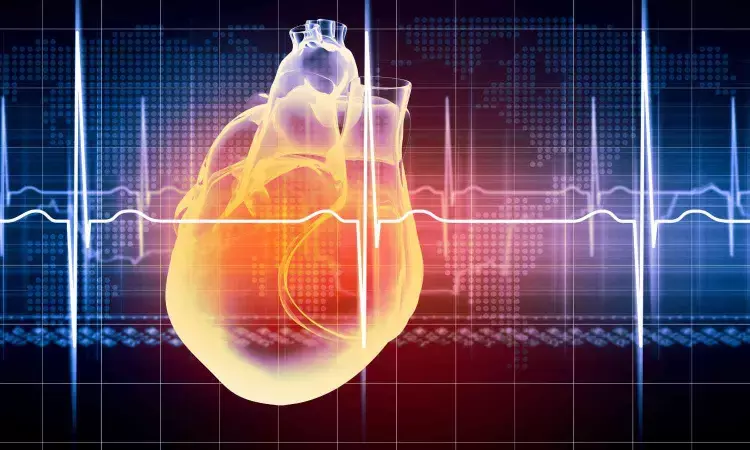- Home
- Medical news & Guidelines
- Anesthesiology
- Cardiology and CTVS
- Critical Care
- Dentistry
- Dermatology
- Diabetes and Endocrinology
- ENT
- Gastroenterology
- Medicine
- Nephrology
- Neurology
- Obstretics-Gynaecology
- Oncology
- Ophthalmology
- Orthopaedics
- Pediatrics-Neonatology
- Psychiatry
- Pulmonology
- Radiology
- Surgery
- Urology
- Laboratory Medicine
- Diet
- Nursing
- Paramedical
- Physiotherapy
- Health news
- Fact Check
- Bone Health Fact Check
- Brain Health Fact Check
- Cancer Related Fact Check
- Child Care Fact Check
- Dental and oral health fact check
- Diabetes and metabolic health fact check
- Diet and Nutrition Fact Check
- Eye and ENT Care Fact Check
- Fitness fact check
- Gut health fact check
- Heart health fact check
- Kidney health fact check
- Medical education fact check
- Men's health fact check
- Respiratory fact check
- Skin and hair care fact check
- Vaccine and Immunization fact check
- Women's health fact check
- AYUSH
- State News
- Andaman and Nicobar Islands
- Andhra Pradesh
- Arunachal Pradesh
- Assam
- Bihar
- Chandigarh
- Chattisgarh
- Dadra and Nagar Haveli
- Daman and Diu
- Delhi
- Goa
- Gujarat
- Haryana
- Himachal Pradesh
- Jammu & Kashmir
- Jharkhand
- Karnataka
- Kerala
- Ladakh
- Lakshadweep
- Madhya Pradesh
- Maharashtra
- Manipur
- Meghalaya
- Mizoram
- Nagaland
- Odisha
- Puducherry
- Punjab
- Rajasthan
- Sikkim
- Tamil Nadu
- Telangana
- Tripura
- Uttar Pradesh
- Uttrakhand
- West Bengal
- Medical Education
- Industry
Patients on antipsychotics quetiapine or haloperidol at higher risk of developing heart rhythm disorders

The use of the antipsychotic drugs quetiapine and haloperidol is associated with an increased risk of ventricular arrhythmias and sudden cardiac death (SCD) caused by drug-induced QT prolongation, reports a new study in Heart Rhythm, the official journal of the Heart Rhythm Society, the Cardiac Electrophysiology Society, and the Pediatric & Congenital Electrophysiology Society, published by Elsevier. Caution is advised to manage cardiac risks in patients prescribed these medications, the authors of the study and an accompanying editorial say.
The risks of cardiac conditions associated with the use of antipsychotics have been a concern for the last 30 years. Drugs have previously been either removed from the market or had their use restricted due to an unacceptably high risk of lethal ventricular arrhythmias. Drug-induced cardiac arrhythmias, however, remain an important clinical issue because there are drugs that increase the risk of SCD, but remain on the market because they serve an important clinical need and there are no safer alternatives.
Professor Jamie Vandenberg, PhD, MBBS, FHRS, of the Victor Chang Cardiac Research Institute, Darlinghurst, NSW, Australia, co-author of the editorial accompanying the study, explains, "Of the 41 drugs on the market in the United States that are listed as having known risk of heart rhythm disorders, five are antipsychotic drugs, the mainstay of treatment for schizophrenia and psychosis. The use of antipsychotic drugs is associated with an approximately two-fold increased risk of sudden cardiac death. If we cannot eliminate this risk, then at the least, we need to minimize the risk by identifying those patients who are at highest risk and managing them more closely."
Lead investigator of the study Shang-Hung Chang, MD, PhD, of the Cardiovascular Division, Department of Internal Medicine, Chang Gung Memorial Hospital, Linkou Medical Center, Taoyuan, Taiwan, adds, "The use of the antipsychotics quetiapine and haloperidol to treat mental disorders is widespread. In an effort to enhance patient safety and optimize the management of individuals receiving these medications, we have investigated the incidences, risk factors, and clinical outcomes of severe QT prolongation to provide valuable insights for healthcare professionals, patients, and caregivers."
The research involved a retrospective analysis of electronic medical records of a large cohort of patients from a healthcare provider in Taiwan who received quetiapine or haloperidol therapy. Investigators evaluated the incidences, risk factors, and clinical correlates of severe QT prolongation (i.e., ventricular arrhythmias and sudden cardiac death) in these patients. The most significant results of the study were that more than 10% of patients developed severe QT prolongation during follow-up and the increased risk of ventricular arrhythmias and sudden cardiac death in quetiapine or haloperidol users who developed severe QT prolongation.
Co-author Chun-Li Wang, MD, of the Cardiovascular Division, Department of Internal Medicine, Chang Gung Memorial Hospital, Linkou Medical Center, Taoyuan, Taiwan, says the findings underscore the importance of closely monitoring patients receiving these medications and implementing appropriate risk mitigation strategies to ensure patient safety. "Clinicians should be aware of the potential risks associated with quetiapine use, particularly the risk of severe QT prolongation and its associated outcomes, including ventricular arrhythmias and sudden cardiac death.”
Professor Vandenberg comments, "It would be prudent to undertake an ECG before and after commencement of an antipsychotic drug. If it is an option, one could stop a drug causing QT prolongation and try a different antipsychotic. But if this is not practical, one should pay particular attention to reducing other risk factors, such as prescription of other drugs that may exacerbate QT prolongation and be vigilant for hypokalemia."
Reference:
Clifford TeBay, Jamie I. Vandenberg, The real-world incidence of severe QT prolongation in patients taking antipsychotic drugs, Heart Rhythm, https://doi.org/10.1016/j.hrthm.2023.11.012.
Dr Kamal Kant Kohli-MBBS, DTCD- a chest specialist with more than 30 years of practice and a flair for writing clinical articles, Dr Kamal Kant Kohli joined Medical Dialogues as a Chief Editor of Medical News. Besides writing articles, as an editor, he proofreads and verifies all the medical content published on Medical Dialogues including those coming from journals, studies,medical conferences,guidelines etc. Email: drkohli@medicaldialogues.in. Contact no. 011-43720751


